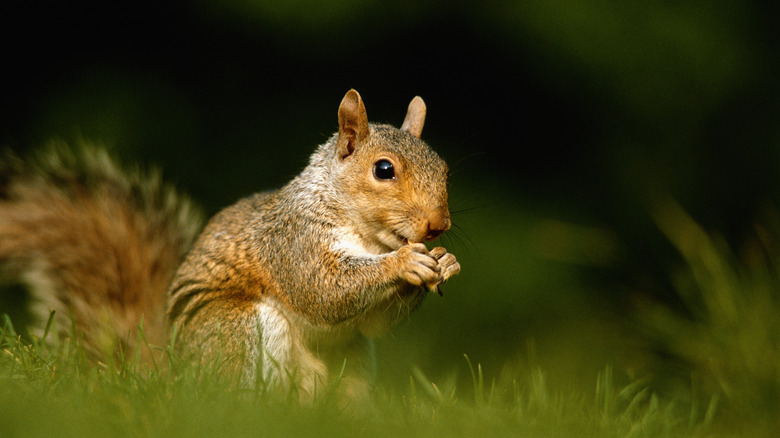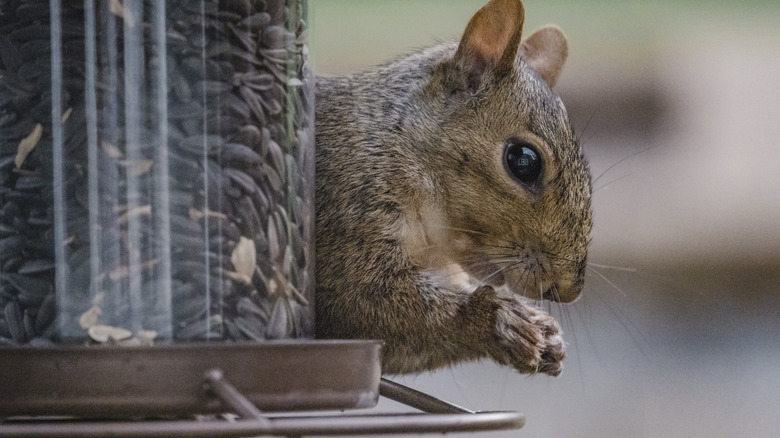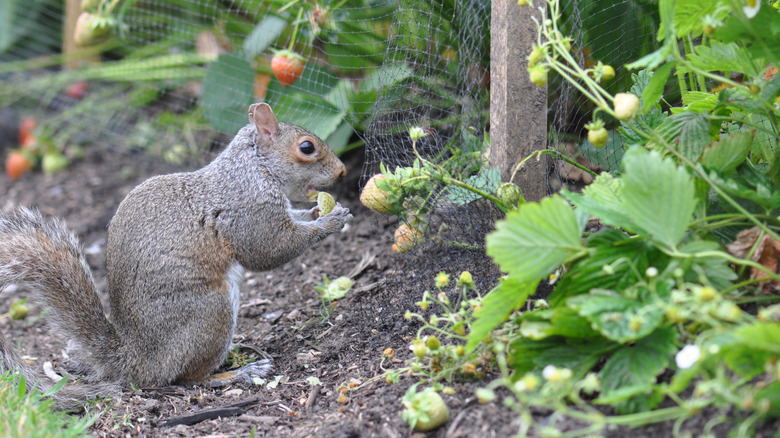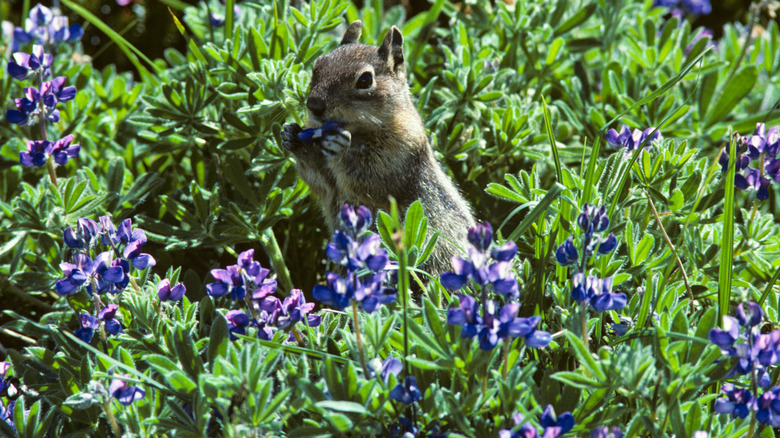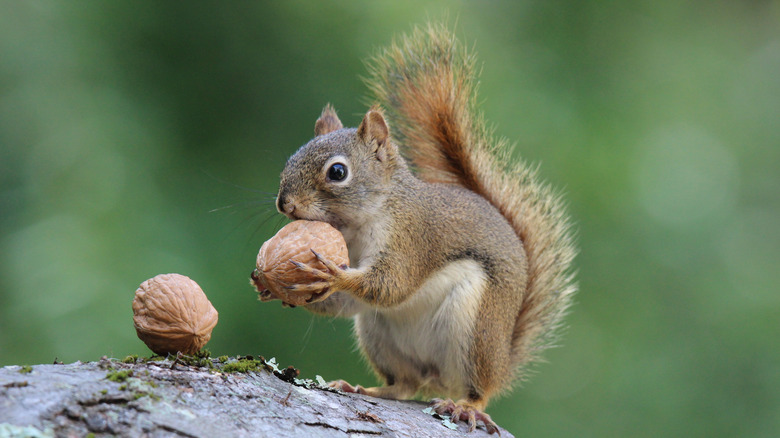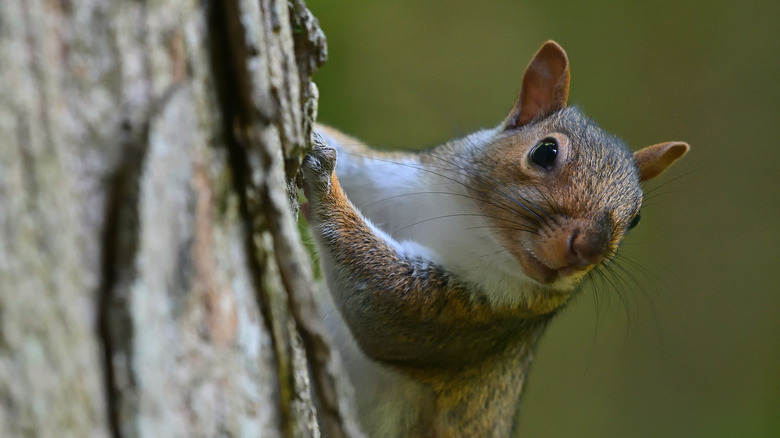5 Common Things That Are Attracting Squirrels To Your Yard And Garden
Squirrels are among some of the most ubiquitous outdoor creatures around, as you're likely to find them in urban, suburban, and rural areas alike. They are also a source of fascination for many, due to their intelligence, acrobatic-like movements, and the way they consume food. Squirrels also have a great sense of smell.
Despite their entertaining behaviors and importance to the ecosystem, squirrels are often defined as pests. This is because they can wreak havoc on a yard and garden relatively quickly. What's worse, if squirrels can find a way into your home's attic after being attracted to your yard, they may take residence up there as well. Depending on the extent of your squirrel problem, you may need professional help to deter them from your outdoor spaces. However, there are also ways to get rid of squirrels on your own, as long as you know what's attracting them to your yard and garden in the first place.
Bird feeders offer easy meals for squirrels
Any potential food source for squirrels may attract these furry creatures to your yard and garden. One of the most common food sources squirrels find pretty easily is a bird feeder. If you are one of the many bird-lovers who have placed feeders to provide seed for wild birds and have looked out in dismay to see a squirrel hogging all the food, know that you're not alone in your frustration. If you don't catch these rodents in action, other key signs of squirrels invading bird feeders include piles of seed underneath them or if the food disappears quicker than normal.
This doesn't mean you necessarily need to get rid of your bird feeders. Instead, you may consider changing the ways in which you feed birds so that squirrels don't target their feeders as an easy food source. First, you can try squirrel-deterring feeders. Depending on the design, these may close when the weight of a squirrel tries to get food as soon as they stand on them. Others have wired cages or smaller openings that make it more difficult for squirrels to access the seed. While not 100% foolproof, squirrel-deterring bird feeders can also prevent them from eating large amounts of bird seed in a short amount of time. Other ways to keep squirrels out of your bird feeders include keeping them off the ground, or selecting seed that squirrels may not find as appetizing, such as millet, safflower, and thistle.
A fruit or vegetable garden may turn into a feast for squirrels
Nothing is more frustrating for a home gardener to find bite marks on the vegetables they've spent so much time growing. If you have gray squirrels in your area, chances are these animals are the culprits behind your fruit and vegetable garden woes. In particular, squirrels love squash, eggplant, and cucumbers. They also love digging in nutrient-rich soil you may use to plant your produce, which may further disrupt the growing process.
Covering your garden is one of the most effective ways to keep squirrels out of your fruits and vegetables. Almanac recommends installing a wire fence, and ensuring that it's at least six inches deep in the ground so squirrels can't dig underneath it. You can also use bird netting on top of the vegetables as well as landscape fabric on the ground. Using gravel instead of mulch is another simple garden addition to keep squirrels out. Aside from this, you may consider using natural repellants against squirrels if they simply won't leave your veggies alone. Options include soap, garlic, and hot chili pepper, as well as certain essential oils such as peppermint. Also, having a source of water for squirrels near your vegetable garden may purportedly deter them from eating certain water-rich items, such as cucumbers.
Squirrels are also attracted to certain flowers and herbs
Aside from garden vegetables, squirrels are attracted to a variety of flowers and herbs you might plant in their garden. Among their favorites are daisies, tulips, and sunflowers. It's also not just fully grown plants and flowers that attract squirrels, as they are known to feast on seeds and seedlings. They may even wander their way into various potted plants you may have around your yard or garden. Whether you have a new plant bed or a relatively mature garden, it's beyond frustrating to have a squirrel unravel all your hard work.
Before you give up on your herbal and flower garden, you can instead use certain deterrents that may discourage squirrels without harming your plants. For example, you can try planting squirrel-repelling plants, such as geraniums, daffodils, hyacinth, lilies, marigolds, and nasturtiums. Squirrels don't care for these flowers because of their strong scents. You may also consider adding mint plants to your garden, as this strong-scented herb is known to repel a variety of different pests.
Stray food and other items in your yard can attract squirrels
Aside from bird feeders and spilt bird food on the ground, there are other potential sources of squirrel food to consider in your yard. Common examples include pet food bowls and bags of their food you might keep outdoors, seeds in your grass, fallen nuts and fruits from trees, and food waste in outdoor garbage cans. Since squirrels are known to dig around for potential sources of food, you may notice small holes in your lawn or garden beds, which are often equivalent to the sizes of golf balls.
The best way to solve this problem is to clean up your yard and remove potential food sources that may be in your yard and garden spaces. Avoid leaving pet food bowls outside, and place all pet food in sealed containers inside your home instead of in an outdoor bin. Pick up any spilt bird food at the end of each day so this doesn't turn into a meal for squirrels and other rodents. At the same time, take a look around your yard and pick up any stray acorns or fallen fruits. Finally, make sure all outdoor garbage cans are fully covered with their lids.
Squirrels may use trees in your yard to find shelter
It isn't just food that attracts squirrels to your yard. Just like any other animal, squirrels need food and water, as well as shelter. You may unknowingly attract squirrels if you have trees in your yard or near your property line that they can potentially use for shelter. They are also known to take bark from trees to help build shelters for themselves. What's more, any trees with large canopies or branches that reach your house can provide squirrels with easy access to your roof, as well as possible damage to your home if they can get inside your attic.
You don't have to remove trees from your property to mitigate a squirrel problem. Instead, make sure trees are pruned regularly, with no branches touching your house. You can also protect tree trunks by wrapping them with sheet metal. Also called baffles, these metal pieces help prevent squirrels from climbing up trees and potentially nesting among their branches.

